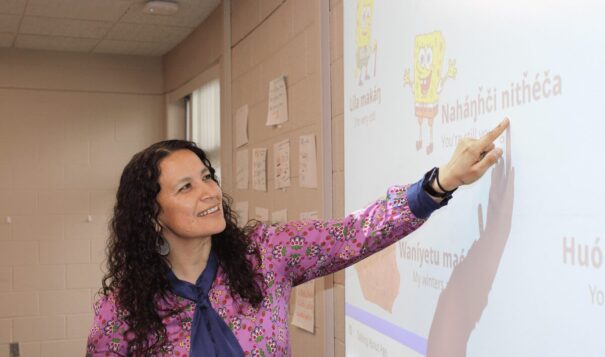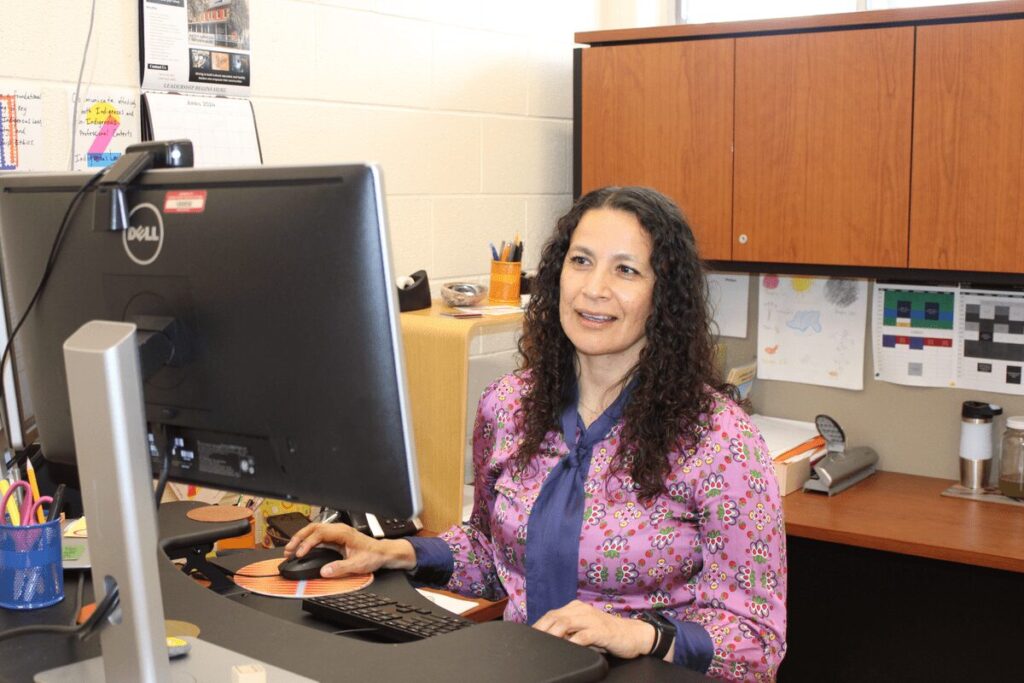News Based on facts, either observed and verified directly by the reporter, or reported and verified from knowledgeable sources.
Reviving Roots: Dakota-Lakota Summer Institute grows number of traditional language speakers
 Sunshine Archambault will be instructing beginner Lakota/Dakota at the language institute this summer. Photo credit/ Adrianna Adame
Sunshine Archambault will be instructing beginner Lakota/Dakota at the language institute this summer. Photo credit/ Adrianna Adame
Educators apply Indigenous language to curriculum
Sacheen Whitetail-Cross was a high school senior in 1998 who wanted to learn her Lakota language. She couldn’t find any options. McLaughlin High School on the Standing Rock Reservation only offered Spanish as a language course. Being unable to formally study Lakota while living at Standing Rock didn’t seem right to her. The dilemma eventually led her to found the Dakota/Lakota Summer Institute in 2007.
The Institute, a program of the Standing Rock Sioux Tribe, has been a pivotal platform for Bismarck educators and community members since its founding, working to revive and sustain the use of Indigenous languages. Last year, for the first time, the three-week program offered in June, teamed up with United Tribes Technical College. It will be held this summer for the second year at the UTTC campus; before, it was held at Sitting Bull College in Fort Yates.
Whitetail-Cross’s story was all too typical. Growing up, she wished she had a program like the institute to immerse herself in. Her grandparents are fluent in Lakota, but she has only picked up parts of the language. “It was around me, but not with me,” Whitetail-Cross said. “I want that baggage to go away so that more people can learn the language in a safe environment. And not be ridiculed or anything like that.”
In her previous role as the tribal education manager at Standing Rock Sioux Tribe, superintendents, principals, and other educators asked her for help creating a professional development program for teaching Lakota in schools.
“I’ve seen a lot of healing happen through the language.”
Victoria Birdshead- Hunkpapa Lakota and Arapaho citizen
“I worked really hard on trying to get it in the whole K-12 systems in the schools and provide and help the schools find and train teachers,” Whitetail-Cross said. She wanted to embed Lakota in the curriculum and to help teachers get the classroom time to teach the students, she said, “because I want a new generation to learn a language. And I wanted them to have more opportunities than I did to learn the language.”
When she first founded the institute, it started out as a K-12 teacher training program, mostly focused on high school teachers. Educators and those training to become teachers were immersed in a room full of Native speakers of the language and surrounded by culture. What started as a K-12 teacher training program went on to become the institute it is today, which, due to demand, is open not just to educators but also to others interested in learning their Native language.
The Summer Institute offers beginner, intermediate and advanced courses and a “Speaker Lab” where class time is for talking. “From Day One, you will be talking about the world around you, about things you enjoy,” according to the curriculum. “No English, no linguistics, no reading and writing – just talking, repeating, and raising some hell!”
One of the classes Whitetail-Cross previously taught was classroom material development, which involves creating games and lessons to inspire language learning.
“A big win was that we had the teachers be able to go into the classroom and use very high-level teaching methods and language acquisition methods that we are able to teach in a different way to engage the students,” Whitetail-Cross said.

Entering its 18th year, the Dakota/Lakota Summer Institute is now funded by United Tribes Technical College, the Standing Rock Sioux Tribe and grants. The original handful of students has jumped to as many as 150 participants in recent years. Whitetail-Cross has taken a step back from leading the program and is now a contracted program manager for the institute. Sunshine Archambault, a citizen of the Standing Rock Sioux Tribe and a faculty member at United Tribes, is now one of its lead organizers.
One of the goals she’s completed is creating an Indigenous Leadership Associate Degree that will launch in the fall. The degree mandates that students demonstrate their proficiency in an Indigenous language and communicate effectively in both Native and non-Native professional contexts.
Archambault also wanted to allow students to learn vocabulary, grammar, and basic sentence structure and apply the language skills they’ve learned in a safe environment.
“When I learned, I could barely count to 10,” recalled Archambault. “I had the Lakota language in my upbringing, in my school. I went to school on Standing Rock and in Pine Ridge so I had a lot of knowledge coming in, but didn’t really know how I was going to connect with my fluent grandmothers, my fluent elders.”
Language revitalization has been a priority for many tribal nations across Indian Country recently. Whitetail-Cross and Archambault see that youth are eager to learn and to overcome the dark history of assimilation that forced many Native speakers to stop speaking their languages. Generational trauma from the Indian boarding schools may prevent older relatives from teaching their children and grandchildren their tribe’s language, said Archambault.
“It’s healing to what was done to our languages, what was done to our grandparents, how forcefully and traumatically it was taken from us,” said Archambault. “We didn’t lose it and we still are speaking it and our kids are speaking it. There’s a pride, a joy, but I think the healing and the sharing [from elders] with everybody –– it’s important.”
Archambault teaches beginner Dakota/Lakota at the Institute. Though participants might initially be nervous, she said they usually grasp it by the end of the three weeks. “Once you start to see how the patterns in our language work, it just opens up for you,” Archambault said.
“I want a new generation to learn a language.”
Sacheen Whitetail-Cross- Standing Rock Sioux Tribe citizen
Victoria Birdshead started off as a student in the language institute in 2017. The Hunkpapa Lakota and Arapaho citizen knew the Dakota/Lakota language but wasn’t sure how to implement it into her curriculum. When the middle school teacher, then a teacher education major, saw the flier for the class, she decided to join. Birdshead recalls an animated Archambault, her first instructor, who seemed excited to teach.
Though there were only a few people in the class, she said, they still had a good time. “I mean, it was kind of scary at first,” said Birdshead. “But once I got the hang of it, it was pretty cool.”
Birdshead describes her experience in the program as life-changing. Over time she began to speak more fluently and felt more in touch with her culture. “It was very memorable,” said Birdshead. “You felt really loved and like your ancestors were there with you.”
Now a middle school teacher at the Standing Rock Community School, Birdshead has been using her skills to teach standard and cultural lessons to her students. With the help of staff from the summer institute, Birdshead taught for the first time as a Lakota instructor in 2023. She assisted Archambault with the beginner language course last summer.
Despite her busy schedule as a teacher and mother to her own children, Birdshead said being an instructor at the institute has been rewarding work. “I love seeing the kids learn and seeing their excitement when they are able to speak it,” said Birdshead. “It really heals them, I think. So I’ve seen a lot of healing happen through the language.”
Those interested in signing up for the 2024 term at United Tribes have until Wednesday, May 8, to apply. Meals will be provided to participants. Those outside Bismarck-Mandan can fill out a summer housing contract to stay in campus dormitories for $40 per night. The CEU courses are free of charge.
Archambault continues to encourage Natives to join as the program grows so they can be supported and become a part of a bigger community. “If someone ever thought they wanted to learn or start to learn, this is a good place to start,” Archambault said.
Corrections:
This story has been updated to include the following corrections: McLaughlin is on the Standing Rock Reservation; only grandparents fluent; manager for Standing Rock Sioux Tribe; removed Kim Campbell; added program manager.
Sourcing & Methodology Statement:
https://uttc.edu/2024-dakota-lakota-summer-institute/
Dateline:
BISMARCK, N.D.
